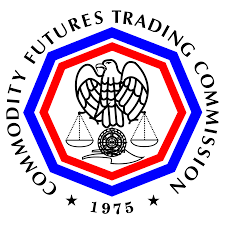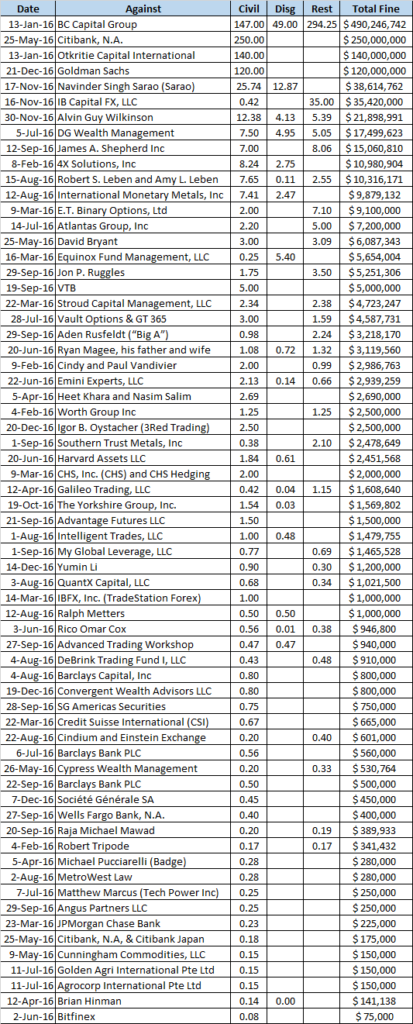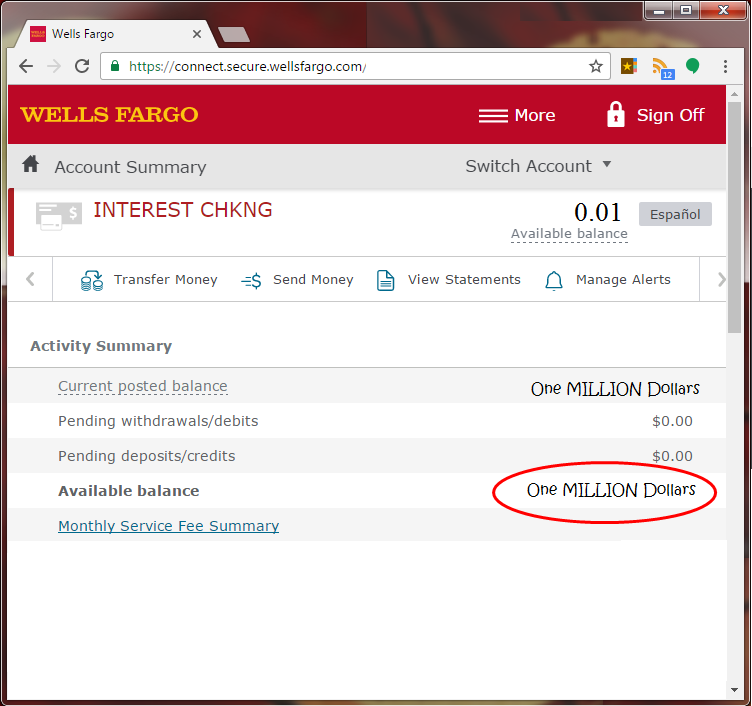Have you ever wondered how many people get in trouble with the CFTC every year, and what they got in trouble for?
Over the holidays, I read through all 103 CFTC enforcement actions from calendar year 2016. As such, I am now in a position to give you my favorite CFTC fines of 2016.
Headline Stats
Before we get there, lets breakdown some headline statistics.
- The CFTC brought 29 new charges

- The CFTC ordered 67 fines (on existing charges)
- The sum of all fines totaled $1.25 billion. Of which, $787 million was civil penalties (so goes to the US Treasury)
- 2 Whistleblower payments were made (one for $10mm, another for $50,000)
- Florida again tops the list for the most penalized jurisdiction, accounting for 21 of the cases. New York had 14 and California 10.
- The enforcement actions were on cases and violations that occurred as far back as 1999. In fact, 68 of them had some violations starting in or before 2012. (ISDAFix for example dates back to 2007)
- There were 4 spoofing cases. The two big high profile ones of course – Sarao and Oystacher. There was another in the UAE, and also an FCM that failed to appropriately investigate claims of spoofing by one of its clients.
- There were 3 cases of “Money Passing”. This is a fraud where you buy and sell illiquid (large spread) products against an accomplice who has access to his (unknowing) firm’s trading accounts and buys & sells to pass profits to you.
- Handful of cases against FCM’s that didn’t file the right reports with the CFTC accurately enough.
Garden Variety Fraud
In reading the cases, there is certainly a common theme. By far, the most common fine belonged to a person or company that did multiple of these:
- Failed to register with the CFTC (as a Pool Operator, CTA, FCM, DCM, etc)
- During solicitation of funds, lied about past performance
- After securing their funds, lied about current performance, often times with false bank statements
- Lost money trading
- Offered leveraged, off-exchange commodity transactions without delivery of the asset
- Misappropriated funds for personal use
- Charged commissions that were astronomical
- Lied to the NFA during the investigation of such frauds
That probably describes 50% of the fines right there. It would seem possible that we all know someone like this. And if you do, the CFTC may pay you handsomely with their whistle-blower program here.
Disgorgement vs Restitution
When you look at the list of all fines, you will see I’ve broken down the fines by:
- Civil Penalty. This gets paid to the US Treasury.
- Disgorgement. This gets paid to those that suffered losses.
- Restitution. This also gets paid to those that suffered losses.
If you remember from my report last year, I struggled to determine the difference between disgorgement and restitution. Both of these are “payback” to clients or investors that were harmed, but if you google it, the difference is not terribly clear. By going through this year’s list, I now have more empirical evidence on the differences, which seems to be:
- Disgorgement: Relates to funds that were misappropriated (the fraudster bought a car with your money)
- Restitution: Relates to funds that were lost because of the fraud committed (the fraudster lost your money trading futures)
Top 10 List
Without further ado, I give you my favorite CFTC fines of 2016:

#10: (13-Jan). The largest total fine of the year ($490 million) was ordered against BC Capital. The firm suffered massive losses and then misled investors about them. What is unique is the sheer size of the losses, and the fact that it seems to have been largely attributable to investments in the Bernie Madoff Ponzi scheme. They later used the MF Global bankruptcy as an excuse for not returning participants’ funds.
#9: (25-May). The largest Civil penalty of the year was $250mm charge against Citibank, for its involvement in manipulating ISDAFix. (Goldman Sachs also got dinged for ISDAFix in December for $120mm.)
#8: (17-Nov). Perhaps the most high-profile case of the year, Navinder Sarao was fined $38mm for his E-Mini S&P spoofing, which included the May 2010 Flash Crash.
#7: (7-Dec). Soc Gen fined $450k for failing to report many FX transactions to Swap Data Repositories for a long stretch of time, following an upgrade to their trading systems. This one is dear to our hearts at Clarus, as we’ve come to rely on SDR trade data and advocate for its accuracy. Notably, Deutsche bank was also charged with an SDR trade reporting violation in 2016, but there has yet to be a resolution.
#6: (15-Aug). Robert and Amy Leben fined over $10mm for being unregistered pool operators that took in over $3mm in funds, and told their investors they were investing in US Treasuries. What they really did with that money was they got plastic surgery, bought a house, car, and went on vacation.
#5: (9-Mar). ET Binary Options Ltd was fined $9.1mm. These guys were based in Israel and offered a binary options trading platform to US clients and never registered as an exchange with the CFTC. What I found surprising was these guys offered a 50% cash bonus on client deposits. The catch – you couldn’t cash out the bonus OR YOUR ORIGINAL CAPITAL until you traded 20 times the value of your account. I presume nobody ever got that far.
#4: (12-Apr). Galileo Trading was fined $1.6mm. These guys fit the typical commodity pool fraud profile, in that they misrepresented their past performance and lost client funds. What’s unique here is this dated back to 1999. In particular, one pool participant invested $960,000 with them in 1999. This investor got annual statements (false ones) and when the investor asked to withdraw just $40,000 in 2013 (14 years later!), he was told that they lost all of his money in the 2010 flash crash. Over the months that followed, the firm came clean and admitted that was a lie; they had not lost it in the Flash Crash, rather, they had really lost it all in 2000!
#3: (3-Jun). Rico Omar Cox fined $946k. Another unregistered commodity pool operator solicited $500k in funds, lost and misappropriated it all. Uniquely here, he also got in trouble for not notifying participants that he had previous felony convictions for fraud and grand theft. Further, when asked by his investors for proof of account balances, he sent them screenshots of a (phony) bank statement! Who would believe that?
#2: (27-Sep). Advanced Trading Workshop was fined $940,000. These guys sold access to a “Room” where you could look over the shoulder of a “Master Trader” who is at the “Absolute pinnacle of his profession”. Only problem was, the guy was trading on a simulated account and had only ever traded for his own account in the 1970s (when he lost money). Clients paid between $5,000 and $7,500 for six months worth of access to this “Master Trader” in this “Room”. As far as I can glean, that might all be legal – you just need to find enough stupid people to pay to see a guy pretending to trade futures in a room. What got them in trouble was they would also give trading signals to the clients in the room, and as such acted as an unregistered CTA.
#1: (12-Oct). A company called “Make Your Fortune” was charged with fraud. I am not making this up. These guys sold a product that gave trading signals, backed up by (phony) trading performance. These guys made over $850,000 doing this. Uniquely here, they sold a “Robot” that claimed to have a 90% success rate at trading futures. The investigation on this one is still ongoing, but perhaps not surprising, the CFTC have already determined that the Robot does not work.
My Advice
After plowing through all of this data, I feel I am in a position to make some various recommendations, as follows:
For Trading Desks at Large Banks:
- Try to avoid manipulating financial benchmarks like LIBOR, FX, etc. I realize this advice is probably 10 years too late. But the regulators are on to this.
For FCMs / Clearing Brokers:
- Try to avoid going under-seg. Meaning, keep enough cash in your client accounts. (There was only one such case this year)
- Get all of your regulatory reports produced accurately and on time.
For Investors:
- Be skeptical of anyone claiming past yearly performance of 200%+
- Check to see if they have a criminal record
- Check to see if they are indeed registered with the CFTC
As I write that, I realize that I am guilty of not doing this myself. I have personally invested with a couple Pool operators, and I can’t say that I have done any due diligence whatsoever. I mean, these guys are clean-shaven, drive nice cars, and send me a Christmas card every year. What other evidence do I need?
Which brings me to my last piece of advice:
For Fraudulent Fund / Pool Operators:

- Shave
- Drive a nice car
- Send your investors a Christmas card
- Try to avoid screenshots of fake bank statements
And Finally
As I stated last year, it still surprises me that the CFTC ever have a budget problem. It’s clear to me that they should simply keep a commission on all of the civil penalties they hand out. Perhaps President Trump will come to the same conclusion.
